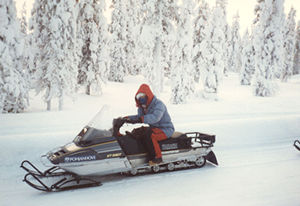
Travel
Johnny Jones, 22 February 2002
"Travel is broadening," I've heard many times. But when I ask for specifics, people laugh and say the delicious food makes them bigger and broader.
We went overseas for the first time in February, 1989. Is it that TransAtlantic flight that qualifies a person as a traveler? The discipline of several hours with no room to stretch out comfortably increases a person's endurance at the least!
But a week in Finland was worth it. From my one short trip to Europe, here's how I found travel broadening.
1. Mentally stimulating. Reading the street signs (printed in Finnish and Swedish) and the maps, the train and tram schedules and the signs on the buildings required effort. Yes, many people spoke English. But in many little bakery shops no one spoke any English at all. Unless we could communicate with gestures or could find the needed word in our Finnish-English dictionary we were stuck for a few minutes until someone speaking our language came in. Learning how to get around, sightseeing and shopping - everything we did was a challenge.
2. Exposure to different values. Finns seem to value practicality and good design in everything from their sensible outerwear (91 ladies on the streets of Helsinki out of the 100 I counted wore boots) to the steam drying racks heating the bathrooms and the towels. Finns seem law-abiding; on the street we saw almost no jaywalking. Even when there was no traffic, people waited for the light to cross. And what a clean country! Rest rooms, even the tiny one on the train, were hospital clean. Rudeness seemed not to be tolerated; loud people in restaurants are asked to leave. Trains and trams were on time; if we wanted to catch them, we couldn't be even a minute late. We got the impression of a clean, efficient, safe country.
3. Different way of observing. Since we were handicapped by our total ignorance of the Finnish language, we had to rely on other methods to observe and learn about people. We looked at clothing styles (many women, even younger women, wore woolen scarves around their shoulders or heads), gestures, and facial expressions. Not knowing the language allowed us to observe unobtrusively.
4. Our different perspective. We became conscious, not only of being citizens of this country, but of being its representatives to the people we met. When a British lady was obnoxiously drunk in a restaurant I thought, "I hope people here can tell the difference in the accent, and know she's not an American." We found that Finnish talk shows were discussing American movies - and the Finns wanted to discuss our politics. We'd better have read Newsweek recently so we could intelligently discuss issues they brought up.
5. Finn's perspective. One of the mothers I spoke to was worrying about the warm spell they were having: It was 32 F when we landed. "The children will catch cold with the melting," she observed. "Better to have it cold and dry."
I asked Sija. the guide on our snowmobile tour north of the Arctic Circle, why she lived in Rovaniemi. "Where my parents live," she said disdainfully, "there was a warm winter and there is no snow on the ground." She liked winter sports, and enjoyed living with snow cover six months of the year.
6. Interesting differences. In rural areas, some Finnish children go to school on cross country skis. We saw kids ice skating and building six-foot-tall snow forts at recess. We saw a baby stroller on runners to accommodate the ice-covered sidewalks. And there was an open-air market by the docks every morning in Helsinki, where we found many varieties of fish, along with the produce they import - and lots of fur. Fur hats and coats were both common and practical.
We also learned what reindeer were for; they were more likely to have been found in Santa's tummy than pulling his sleigh. Smoked reindeer is delicious. The Lapps used reindeer like the Plains Indian used the buffalo; no part of the animal was wasted.
Yes, travel is broadening. Part of it is seeing the differences; the other part is realizing the similarities. We saw people who looked like kinfolk. Only their language - not their appearance, mannerisms, or carriage - told us they weren't from next door. I guess that's the point. When we identify with people we start to care about them. We can admire other's differences while cherishing our own country and its values. Maybe that's what Laurence Sterne meant when he said, "A man should know something of his own country, too, before he goes abroad."
Ten days in Finland does not qualify a person for much deep analysis. But we can start to understand a little about the Finn's reported toughness and independence. We are able to realize some of the pressures they've faced over the years. Maybe it's this empathy that's broadening - getting beyond ourselves to think about others. Perhaps it's not the mind or the body that's broadened so much as the heart. That's what makes it worth the trip.
